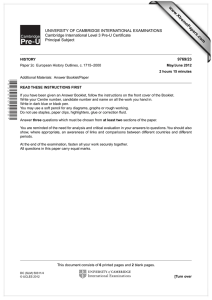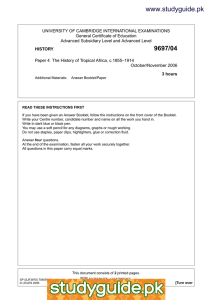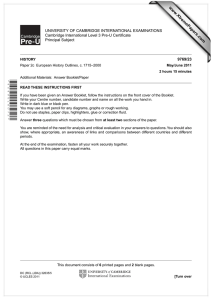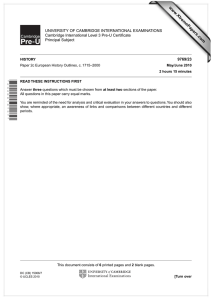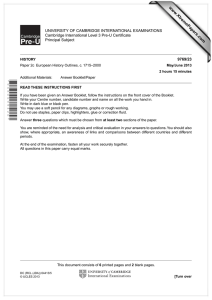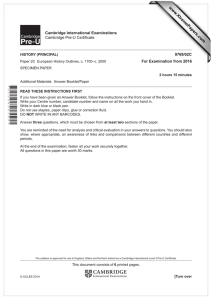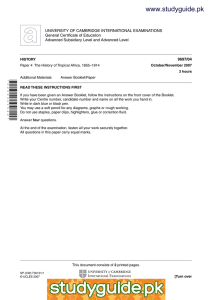www.XtremePapers.com Cambridge International Examinations 9769/23 Cambridge Pre-U Certificate
advertisement
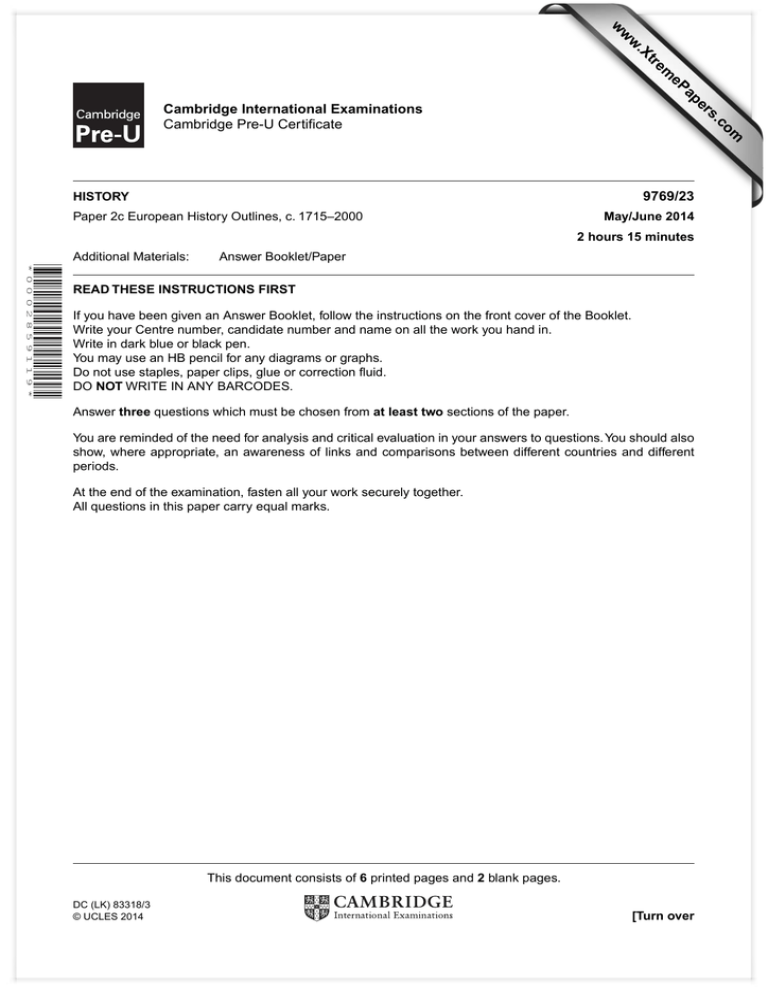
w w ap eP m e tr .X w om .c s er Cambridge International Examinations Cambridge Pre-U Certificate 9769/23 HISTORY Paper 2c European History Outlines, c. 1715–2000 May/June 2014 2 hours 15 minutes Additional Materials: Answer Booklet/Paper * 0 0 0 2 8 5 9 1 1 9 * READ THESE INSTRUCTIONS FIRST If you have been given an Answer Booklet, follow the instructions on the front cover of the Booklet. Write your Centre number, candidate number and name on all the work you hand in. Write in dark blue or black pen. You may use an HB pencil for any diagrams or graphs. Do not use staples, paper clips, glue or correction fluid. DO NOT WRITE IN ANY BARCODES. Answer three questions which must be chosen from at least two sections of the paper. You are reminded of the need for analysis and critical evaluation in your answers to questions. You should also show, where appropriate, an awareness of links and comparisons between different countries and different periods. At the end of the examination, fasten all your work securely together. All questions in this paper carry equal marks. This document consists of 6 printed pages and 2 blank pages. DC (LK) 83318/3 © UCLES 2014 [Turn over 2 Section 1: c. 1715–c. 1774 1 ‘Badly governed at home and unsuccessful abroad.’ Discuss this view of France either under the Regency or under Fleury. 2 How effectively were the Habsburg lands ruled in this period? 3 Compare and contrast the contributions of Frederick William I and Frederick II to the development of Prussia. 4 How well ruled was Spain under the Bourbons in this period? 5 ‘The reign of Louis XV, after 1743, demonstrates all too clearly what was wrong with the ancien régime.’ Discuss. Section 2: c. 1774–1815 6 ‘Thoroughly undeserving of the title “Enlightened Despot”.’ Discuss this view of Joseph II. 7 ‘Clever and successful.’ Discuss this view of the foreign policy of Catherine the Great. 8 (Candidates offering Paper 5f: The French Revolution should not answer this question.) How important were economic factors in bringing about the crisis in France in 1789? 9 ‘Of enormous benefit to France.’ Discuss this verdict on Napoleon’s domestic policies. 10 ‘Unwise experiments followed by savage reaction.’ Discuss this view of the domestic policies of Alexander I. © UCLES 2014 9769/23/M/J/14 3 Section 3: Themes c. 1715–c.1815 11 ‘The role of women in the cultural life of the eighteenth century was of greater importance than their role in intellectual and political life.’ How far do you agree? 12 ‘Profound and deeply influential.’ How valid is this judgement on eighteenth-century political thought? 13 How far did formal rules and conventions inhibit true creativity in eighteenth-century music? 14 Discuss the view that colonies in the eighteenth century brought few benefits to their European owners. 15 Assess the nature and extent of industrial development in eighteenth-century Europe. 16 What best explains changes in styles of monarchy in Europe during this period? Section 4: 1815–1862 17 How realistic were the solutions of the Vienna Settlement to the issues faced by the peacemakers? 18 To what extent, if at all, did the reign of Nicholas I benefit Russia? 19 ‘Charles X deserved to fall; Louis Philippe did not.’ Discuss. 20 Why was a united Germany not achieved before 1871? 21 ‘The main reason for the unification of Italy by 1861 was the success of Cavour’s diplomacy.’ Discuss. © UCLES 2014 9769/23/M/J/14 [Turn over 4 Section 5: 1862–1914 22 To what extent did the foreign policy of Bismarck in the period 1871 to 1890 achieve its aims? 23 How stable was Wilhelmine Germany? 24 Who ruled Russia more effectively in the period 1881–1914: Alexander III or Nicholas II? 25 Was Italy more divided in 1871 or in 1914? 26 ‘No one country, but rather irresponsible militarism throughout Europe, should be blamed for the First World War.’ Discuss. Section 6: Themes c. 1815–1914 27 Why was the Eastern Question so difficult to resolve in the period 1815–1914? 28 What best explains why the European powers had so much interest in the acquisition of territory outside Europe in the second half of the nineteenth century? 29 To what extent can changes in any one of the arts in this period be explained by changes in society? 30 Which had the greater impact on the people of Europe in this period: industrial growth or the development of transport? 31 Assess the impact of Marx’s political and economic ideas in later nineteenth-century and early twentieth-century Europe. 32 Why did the status of women change more in some countries than others in Europe in the period c. 1850–c. 1914? © UCLES 2014 9769/23/M/J/14 5 Section 7: 1914–1945 33 Given the heavy loss of life, why was there not more opposition in the combatant states to the First World War? 34 ‘The principal failing of the Paris Peace settlements after the First World War was that they were excessively idealistic.’ Discuss. 35 (Candidates offering Paper 5l: Germany should not answer this question.) How far do economic factors explain the fall of the Weimar Republic? 36 Did Stalin better serve the interests of Russia before or after 1941? 37 ‘It is a gross simplification to see the conflict which developed from 1939 to 1945 as “Hitler’s War”.’ Discuss. Section 8: 1945–2000 38 How serious were the challenges to Soviet domination in the satellite states of Eastern Europe in the period from 1953 to 1985? 39 Assess the importance of Adenauer to securing political stability in West Germany. 40 ‘The USA was responsible both for beginning and ending the Cold War.’ Discuss this view. 41 Assess the importance for France in the years 1945–62 of developments in Algeria. 42 How far did Franco achieve his aims as ruler of Spain in this period? © UCLES 2014 9769/23/M/J/14 [Turn over 6 Section 9: Themes c. 1914–2000 43 Assess the legacy of European imperialism after 1945. 44 To what extent had the European Union benefited the people of its member states by 2000? 45 Was European cultural life more dynamic in the inter-war period or in the 1960s and 1970s? 46 How well did European states deal with demographic change in the period after c. 1945? 47 To what extent, if at all, did the feminist movement enhance the status of women in Europe in the later twentieth century? 48 Who gained and who lost from the revolution in communications in post-war Europe? © UCLES 2014 9769/23/M/J/14 7 BLANK PAGE © UCLES 2014 9769/23/M/J/14 8 BLANK PAGE Permission to reproduce items where third-party owned material protected by copyright is included has been sought and cleared where possible. Every reasonable effort has been made by the publisher (UCLES) to trace copyright holders, but if any items requiring clearance have unwittingly been included, the publisher will be pleased to make amends at the earliest possible opportunity. Cambridge International Examinations is part of the Cambridge Assessment Group. Cambridge Assessment is the brand name of University of Cambridge Local Examinations Syndicate (UCLES), which is itself a department of the University of Cambridge. © UCLES 2014 9769/23/M/J/14

